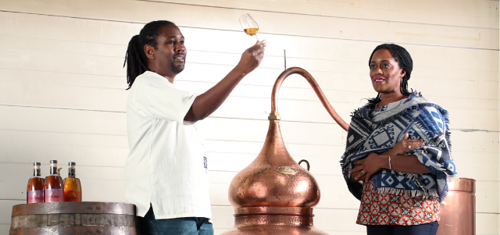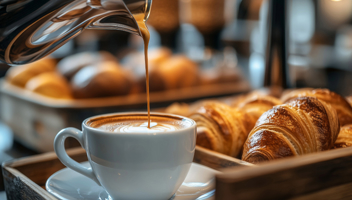Co-founder Jacine Rutasikwa explains how the Livingston-based drinks producer has reacted to lockdown and tapped into survival instincts to enable it to thrive in adversity.

What has changed in your sector since lockdown?
Restrictions and lockdowns in the wake of COVID-19 have resulted in acute societal upheaval and economic disruption for the UK drinks trade. The closure of bars, restaurants and other indoor hospitality venues led to an immediate loss of critical bricks-and-mortar alcohol sales.
Other routes to markets for alcohol producers are trade and consumers events. The calendar of spring and summer food and drinks festivals, spirits fairs and trade shows collapsed. Most have been postponed until 2021, while others have successfully migrated online.
Fundamentally, consumers transitioned their on-premise spending to at-home consumption. Shoppers moved online generating a huge surge in the e-commerce alcohol sector and creating new digital opportunities for consumers, drinks producers and retailers alike (e.g., on-demand alcohol delivery services).
The new home-based lifestyle has seen consumers enjoying more ready-to-drink cocktails and experimenting at home with making cocktails.
What have you done in response?
In response to the appeal to distilleries to assist the country’s shortage of hand sanitiser, my husband Paul (head distiller) and I quickly switched the production focus at our family-owned rum distillery in Livingston.
We have spent much of lockdown making hand sanitiser, adhering to the WHO-approved formulation. We launched a Crowdfunder campaign which helped us to donate over 1,000 litres of sanitiser to our local healthcare providers, frontline services and community workers as well as selling critical supplies to local businesses.
In time, the conventional suppliers of sanitiser were able to boost their production levels and we reverted to prioritising our conventional business of distilling artisan rum.
With our beloved distillery tours and tasting events on hold until the autumn, we turned to offering virtual tasting events. Pivoting the experience online has been an ideal way of remaining in social contact with rum novices and connoisseurs who wish to explore our rum-making craft and enjoy our spirits.
We recently released Liv Rum, an innovative new artisan rum collection that we had hoped to launch before the coronavirus outbreak. As a companion brand for Matugga Rum - our award-winning cask-aged rum range - the new range consists of white and spiced rums and flavoured rum liqueurs.
The range has diversified our offering and will help us to cultivate a new generation of rum drinker. Our rums will also be showcased at the inaugural virtual Scottish Rum Festival on Saturday 25th July 2020.
As a business we’ve worked hard to maintain our brand communications over the past few months, in order to continue to reinforce our proposition and communicate our value. We strategically sustained our marketing investment in the hope that it would support post-pandemic growth.
What have been the consequences of your change in behaviour/operations?
As an early-stage and ambitious business, we have worked hard to not lose sight of the bigger picture and our strategic goals. It has been a time for revisiting our strategy to build residual value and long-term gain.
We have been thinking strategically about how we can build our new and existing brands, broaden our services and deepen our differentiation and competitiveness (e.g. through NPD and accelerating our aged stock) over the next 12 months and beyond.
We are also thinking about how we can best leverage the new digital and e-commerce opportunities for sales, promotions and engagement.
What are your predictions for the short term in your sector?
Health and hygiene concerns will continue to see consumers spending more time at home and preference for in-home eating and drinking is likely to hold.
As we make slow, steady steps out of lockdown and more pubs, restaurants and hospitality venues begin their recovery journeys after such a long closure, there’s the hope that those bricks-and-mortar trade sales will experience a ‘mini boom.’
What are the changes that will ‘stick’ once out of lockdown and affect your sector for the longer term?
We are at the very beginning of our understanding about the impact of COVID-19.
Social distancing has fundamentally changed our shopping and consumption behaviours, and has driven our home-based lifestyles. We can expect the practical and psychological effects of the pandemic to linger for some time.
Periodic epidemic waves and intermittent social distancing may return. In addition, as the economic reality of the impending recession looms we’ll likely see more cautious consumer spending.
This is without doubt the most uncertain period we’ve known as business owners with no end in sight for the flux and unpredictability within our sector.
However, it remains that we are hardwired to survive, aren’t we?
David Morgan, Partner and member of the food & drink team at Burness Paull was in conversation with Jacine Rutasikwa, co-founder of Matugga Distillers.
Related News, Insights & Events

Expansion of Right to Work checks: What you need to know
This blog discusses the UK government's tougher stance on immigration compliance, particularly around right to work checks.

What’s next for food & drink sector regulation? Key changes to be aware of
The food and drink industry has seen a number of challenges and changes in recent years, and the outlook for the rest of 2025 is no different.

Significant new obligations for employers who handle staff tips
Starting October 1 2024, significant changes to the law will impact how employers manage tips.





